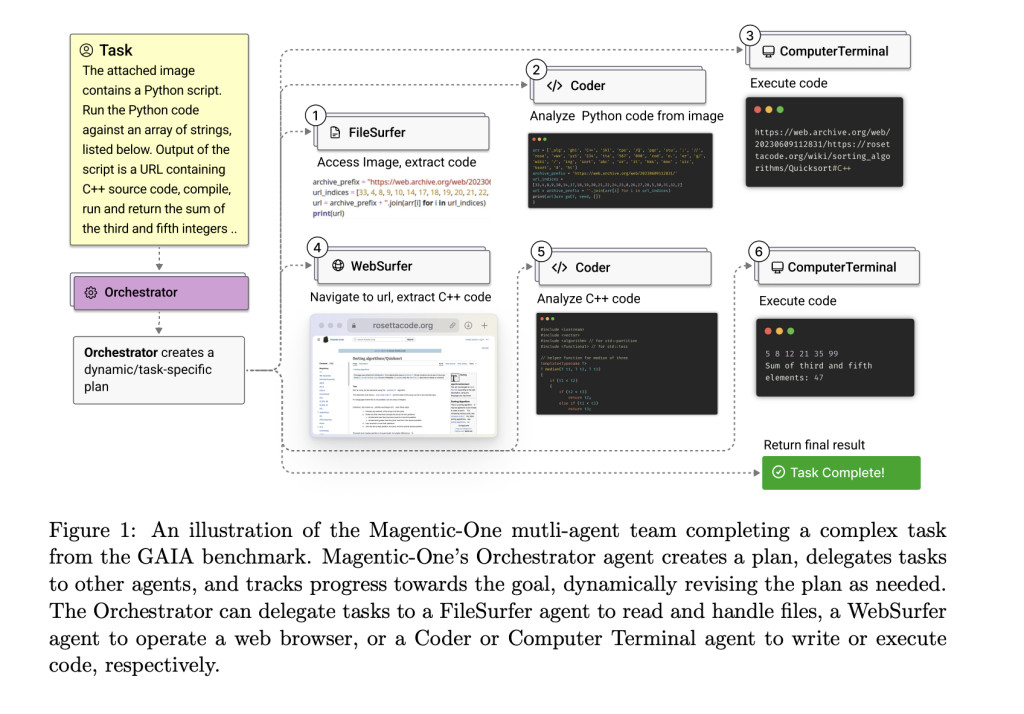

Agentic systems are a progressive branch of artificial intelligence that aims to create solutions capable of autonomously handling complex, multi-step tasks across various environments. These systems go beyond the typical scope of machine learning models by incorporating capabilities that allow them to perceive and act within real-world digital settings, integrating knowledge, reasoning, and adaptable decision-making processes. With substantial advancements in large language models (LLMs), such as those enabling web navigation, data analysis, and coding, agentic systems promise to relieve users of repetitive or technical tasks. These models have found practical applications in areas as diverse as software engineering and scientific research, adapting to real-time interactions that more static systems fail to manage effectively.
The primary issue the research addresses involves enabling AI systems to operate reliably in unpredictable and complex task environments. Traditional approaches to autonomous agents face significant limitations when seamlessly transitioning between tasks like data retrieval, code execution, and interaction with online platforms. These environments demand precise actions and flexibility to adapt plans based on input or task error changes. With this adaptability, single-agent systems can achieve efficient task completion. However, they often become stuck or repeat tasks due to insufficient error-handling mechanisms or an inability to coordinate multiple steps dynamically.
Many of today’s single-agent approaches attempt to integrate these functions but often fail to handle the broad spectrum of tasks in more open-ended scenarios. Single-agent systems can struggle with complex workflows and dynamic task transitions despite incorporating LLMs with multi-modal capabilities. The inability to properly plan and re-plan as tasks evolve or encounter errors limits the efficiency of these agents in scenarios demanding cross-functional skill sets, such as file navigation, coding, or web-based research. Existing methods tend to centralize control in a monolithic structure, causing bottlenecks that hinder flexibility and adaptability.
Microsoft Research AI Frontiers researchers introduced Magentic-One, a modular, multi-agent system tailored to overcome these obstacles. Magentic-One features a multi-agent architecture directed by a core “Orchestrator†agent, responsible for planning and coordinating across specialized agents like the WebSurfer, FileSurfer, Coder, and ComputerTerminal. Each agent is specifically configured to manage a unique task domain, such as web browsing, file handling, or code execution. The Orchestrator dynamically assigns tasks to these specialized agents, coordinating their actions based on task progression and reevaluating strategies when errors occur. This design enables Magentic-One to handle ad hoc tasks in an organized, modular approach, making it especially well-suited to adaptable applications.
The inner workings of Magentic-One reveal a carefully structured approach. The Orchestrator operates through two levels of task management: an outer loop, which plans the overarching task flow, and an inner loop, which assigns specific tasks to agents and evaluates their progress. These loops allow the Orchestrator to monitor each agent’s actions, restart processes when necessary, and redirect tasks to other agents if an error or bottleneck arises. This design offers an advantage over single-agent systems, as Magentic-One can add or remove agents as needed without disrupting the task workflow. For example, if a task requires browsing for specific information, the Orchestrator can assign it to the WebSurfer agent, while the FileSurfer may be engaged in processing related documents.
Magentic-One was tested on three demanding benchmarks: GAIA, AssistantBench, and WebArena. On the GAIA benchmark, Magentic-One achieved a 38% task completion rate, while on WebArena, it attained 32.8%. For the AssistantBench, Magentic-One achieved 27.7% accuracy, performing competitively with state-of-the-art systems tailored for these benchmarks. The system’s ability to handle these tasks with minimal specific tuning showcases its potential as a flexible and generalizable AI solution. Further, the modularity of Magentic-One proved advantageous in ablation experiments, where performance was maintained even when certain agents were removed from specific tasks. This modular approach highlights the potential for creating adaptable multi-agent systems capable of generalizing across task types and domains.
Key Takeaways from the research on Magentic-One:
- Performance: Achieved competitive task completion rates across GAIA (38%), WebArena (32.8%), and AssistantBench (27.7%), establishing it as a robust multi-agent system for complex, multi-step tasks.Â
- Modular Architecture: Each agent in Magentic-One specializes in a task domain (e.g., web browsing, file handling), allowing flexible and coordinated task management.
- Dynamic Task Management: The Orchestrator employs an outer and inner loop system for task assignment and monitoring, ensuring adaptability in handling errors or rerouting tasks as needed.
- Benchmark Success: Demonstrated capability on GAIA, AssistantBench, and WebArena benchmarks without extensive tuning, reflecting its potential as a generalizable AI solution. Â
- Scalability and Extensibility: The modular design facilitates the addition or removal of agents, paving the way for future applications requiring varied task capabilities without altering the entire system.

In conclusion, Magentic-One exemplifies a leap forward in creating flexible, multi-agent AI systems capable of autonomously solving complex tasks. It leverages a modular design where each agent specializes in a distinct task, coordinated by a central Orchestrator that dynamically reassigns tasks based on task complexity and requirements. By achieving high task completion rates and performing comparably to state-of-the-art systems across three major benchmarks, Magentic-One demonstrates the effectiveness of modular, multi-agent architectures. Its design addresses the need for error handling and adaptability and allows easy expansion to incorporate new agents and capabilities.
Check out the Paper, Details, and GitHub Page. All credit for this research goes to the researchers of this project. Also, don’t forget to follow us on Twitter and join our Telegram Channel and LinkedIn Group. If you like our work, you will love our newsletter.. Don’t Forget to join our 55k+ ML SubReddit.
[Sponsorship Opportunity with us] Promote Your Research/Product/Webinar with 1Million+ Monthly Readers and 500k+ Community Members
The post Microsoft Researchers Introduce Magentic-One: A Modular Multi-Agent System Focused on Enhancing AI Adaptability and Task Completion Across Benchmark Tests appeared first on MarkTechPost.
Source: Read MoreÂ

